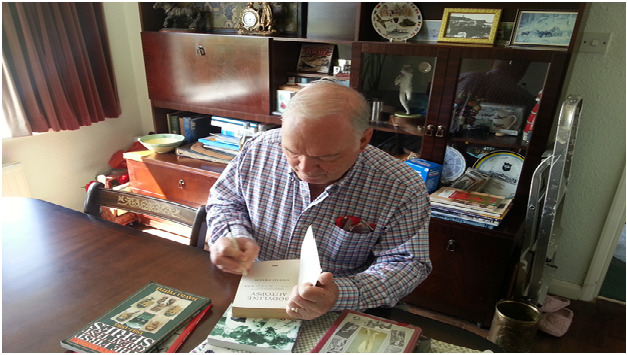
David Frith: The man who penned, kept and ate words
Penning words is fine. Keeping them also makes sense. Until and unless used as an idiom, eating words makes sense as well, but what if it is not used here as one? — Let’s find out!
Well, if you’re a Bollywood freak like me, the title of this piece must have perhaps reminded you of an iconic dialogue by megastar Amitabh Bachchan in his film ‘Namak Halaal’ because of the undertone of penning ‘words’, keeping ‘words’, and eating ‘words’. For the uninitiated, the prominent dialogue goes as “I can talk English, I can walk English, I can laugh English because English is a funny language.”
Of course, English may sometimes seem to be a funny language, but its subject matter requires more serious deliberation than one can think, especially its tool, i.e., the words used while writing or communicating verbally. Thus, in view of what Auliq Ice has rightly said, “Be sure to taste your words before you spit them out.”, we shall now proceed to unveil David Frith and an eerie episode from his life which quintessentially testifies the given quote, putting out a crucial lesson and setting a much-needed example for writers, editors, journalists, etc. across the world.
David Frith, one of the foremost veteran writers and historians in the arena of cricket, befriended his pen for the longest time more than anything else in his life. Therefore, he has been writing impeccable cricket books since 1969. With over forty-five books written already, it is worth noting how each and every one of them is exceptionally well-researched and that too to a level of detail which is quite rare and perhaps fleeting in today’s world of rushed publishing. By virtue of this differentiator, his work has attracted a considerable number of awards and honours for him.
Apart from being the most respected name in cricket writing, a sports journalist, and a first-grade cricketer, he had also been the editor of The Cricketer from 1972 to 1978. Thereafter, as a founding editor, he finally launched his very own magazine named Wisden Cricket Monthly in 1979 and served in this position for seventeen years. This English magazine in no time became popular. It attracted a huge reader base and became the most sought-after magazine among cricket enthusiasts.
The original version is known to have run from June 1979 till September 2003 although its new digital versions exist too, serving cricket lovers plates full of ‘crickety’ news and various latest developments. It is four years later after the launch of WCM that David Frith witnessed a moment which is bound to remain forever etched in the world of journalism and also the history of Indian cricket. Hence, let’s start from the beginning.
We all know that India’s performance in the first two World Cups was, to say the least, unsatisfactory. In 1975, India had just won one match against East Africa and suffered heavy defeats in the remaining two. In 1979, India failed to register any victory and was even beaten by the Associate Sri Lankan cricket team. Thus, very naturally, there were neither any expectations from them nor were there any enthusiastic fans who would want to watch them in 1983. In fact, many expressed their doubts over the Indian cricket team performing any better than before, but it was Mr. Frith who actually went a little too far. But before we too go ‘farther’, let me put things into relatable perspective for every Indian, cricket maniac and sucker of Bollywood out there:
David Frith (played by Pete Picton in the movie titled 83) is the very man to whom our legendary Indian cricket team’s former captain Kapil Dev (played by Ranveer Singh) gave an iconic reply “We here to win!” at a press conference when asked about his team’s chances in the 1983 World Cup — In case you haven’t watched the movie already, watch 83’s official trailer, skip to 1:40 and thank me later!
Thus, in the June 1983 edition of his newly found magazine, right before the third edition of the Cricket World Cup tournament, David wrote for the Indian cricket team, “If their pride is not important enough to spur them to wholehearted effort this time, they might as well give way to other would-be participants in 1987.” He went on to also write that unless India could adapt to one day format (60-over cricket at that time), they should perhaps withdraw their names from the next editions of the esteemed tournament.
In other words, he objected to the idea of India being invited to the World Cup because of their dismal past record and their indifference with ODIs gave him no good hope either. Thus, according to him, India would eventually exit the tournament early. He had even penned in the body of the article that he would be happy to eat his words if India progressed beyond the league stage.
And hurrah, it was not even a month after the article was published when the esteemed Indian cricket team successfully weaved an unbelievable story laced with the fabric of magical sporting glory. The day, 25th June 1983, was when cricket in India finally inched a thousand steps towards fostering unity among the Indian populous. But amidst all the celebration and cheer, Mr. Man Singh Panwar, the Indian cricket team’s manager (enacted by one and only Pankaj Tripathi in 83) still had the words oozing mockery and sheer contempt penned by David Frith lingering in the deepest corners of his heart.
Thus, deeply affected, Man Singh drafted an interesting letter which asked the famous sports journalist to pay up for what he wrote. To quote, Singh wrote, “I will give him a sporting chance to eat his words now that the team he wrote off has won the World Cup, defeating en route West Indies, Australia and England.” Further, he also asserted, “In all fairness to good journalism and sportsmanship, Mr. Frith should eat this.” Since a mere verbal or written retraction would not have done for Man Singh, he gave David Frith the liberty to lace the piece of paper with chocolate sauce and gulp it down with a drink, either ale or stout as a both polite gesture and palliative measure.
Since those were indeed the days of accountability, to everyone’s shock and the Indian cricket team’s delightful pride, David Frith, literally did what he had apparently said and undertook it in exactly the same way as proposed by Mr. Singh without taking the entire scenario as an insult. He got a copy of his published piece and was given the choice to have any beverage he liked while he eats. He reportedly chose red wine, to gallop the meal of those paragraphs though the wine couldn’t have done much for him to not disguise the taste of paper and bravely intake intoxicating chemicals of printed ink.
The letter written by Mr. PR Man Singh
Thus, the September 1983 edition of WCM published a copy of Singh’s letter along with a photograph of Frith with the offending paper cutting in his mouth, captioned, “India made me eat my words”. A photo of Frith was also published in the daily along with the same letter. The rueful grin on his face indeed attested that one must taste his or her words well before spitting them out, for English as well as no other language can ever be taken lightly. Thus, it was the difference between the literal and non-literal/idiomatic meaning of the phrase “eating one’s words” which was narrowed to the former meaning by Mr. Singh, inducing a public apology from a distinguished sports journalist.
It was, after more than two decades, through one of his other writings and perhaps also through an interview that Frith told he was never ‘forced’ to eat a piece of paper rather it was suggested that he might do so in the very spirit of accountable journalism after India’s victory. He even added that he was, in fact, very glad to do so. He expressed that there was no malice in his thoughts and that he had always been fond of India and Indian cricket but their past drab performance was what annoyed him, stating “It was, I suppose, sheer frustration that persuaded me to write those words.”
While being interviewed by a Pakistani daily, Frith also said that he claimed some credit for pushing Kapil Dev, the captain, and the Indian team to succeed. He said, “If my words goaded them into taking the World Cup more seriously then I’m delighted.”
He swallowed the paper cutting with a tankard in the other hand.
Thus, being a man of his word, David Frith kept his words by ‘eating’ them. Cricket indeed seems to be Frith’s way of life. He has written cricket, breathed cricket, lived cricket, and in one kind of a show, eaten write-ups related to cricket as well. But his accountability, humility, integrity, and sportsmanship are what, in the truest sense, is his real way of life. Thus, it’s time that each one of us in the media industry today realizes the need to never take the power of our mighty pens for granted while also keeping a check on our tongues and taking full responsibility for what we say or write sans any friction.
Written by- Aakriti Sanghi
Edited by- Heeral Dattwani
The post David Frith: The man who penned, kept and ate words appeared first on The Economic Transcript.
RELATED POSTS
“Got Stuck with a B...
Shopping for presents can be a stressful experience and returning them can sometimes be just as overwhelming. For those who receive an item that may not fit their needs or isn't of the right quality, returning an item can be
‘How High are the S...
The investigation into the recent Alaska Airlines flight has been met with high stakes, according to Robert Sumwalt, the chair of the National Transportation Safety Board (NTSB). The plane, operating as Flight 261, crashed in the Pacific Ocean on January
“Is the Stanley Cup...
It’s no secret that hockey fans across the world have been eagerly awaiting the NHL Stanley Cup Finals. After a thrilling regular season and an even more exciting playoff run, the Stanley Cup is finally set to start. The hockey




